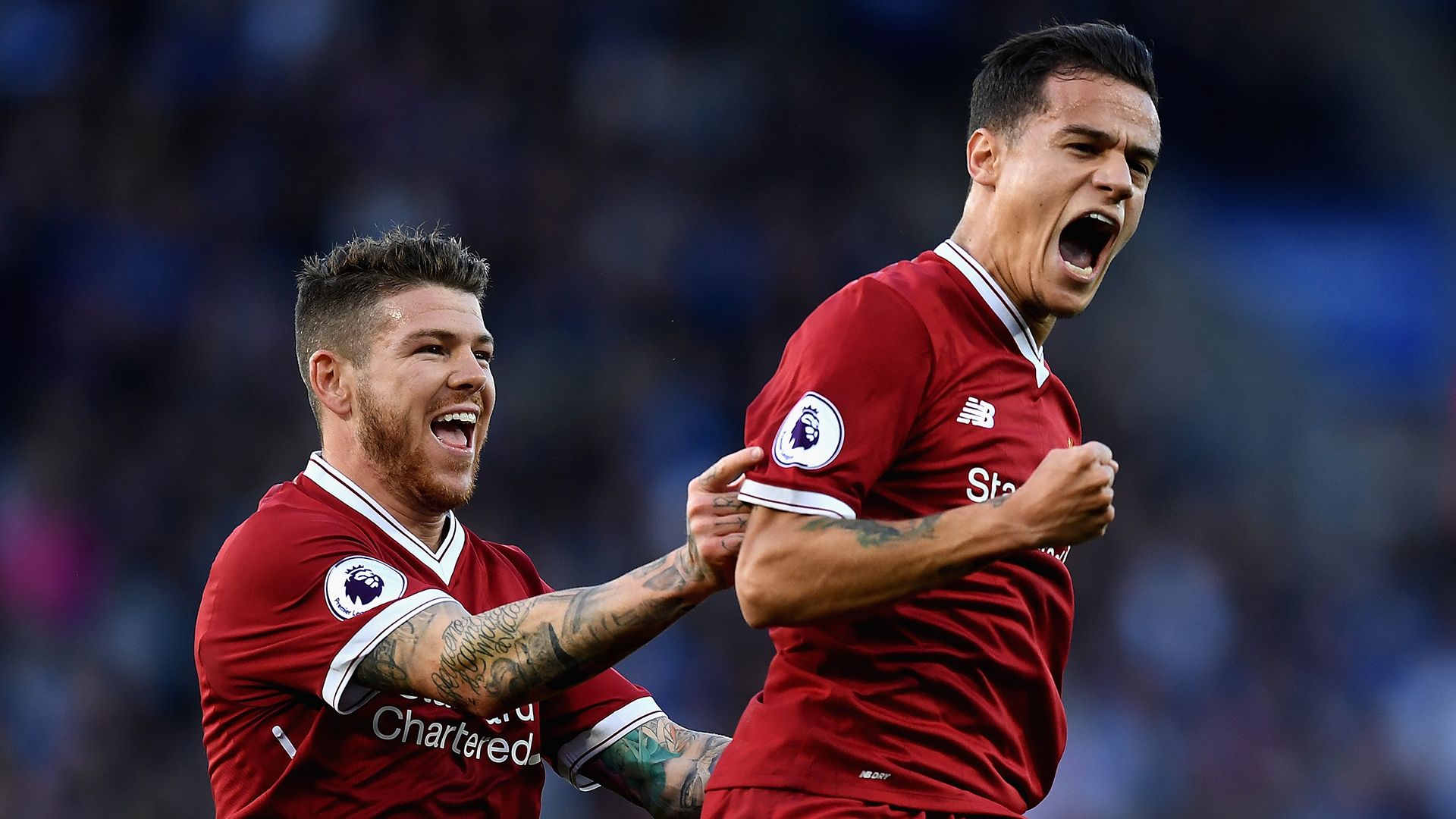At this point, the world transfer market for strikers is fairly efficient. Guys who can get you goals command high fees, are highly paid, and very few good ones get overlooked. They might also get overpaid, but a lot of that has to do with scarcity of elite forwards, and a preponderance of a lot of clubs with a lot of money who need the best. One of the reasons for general efficiency in this area is that the value of forwards is obvious.
- Goals are valuable.
- Lots of goals are very valuable.
- We need to score goals in order to win.
Conclusion: Forwards who score lots of goals are very valuable to us.
It helps that they are also easy to identify.
Why are we talking about forwards and transfers when this piece is about set pieces? Because the market for coaching expertise is laughably inefficient, and better set piece attack and defense comes from coaches.
A couple of weeks ago I was on a panel at the Royal Statistical Society conference in Glasgow when Omar Chaudhuri made exactly this point. “Premier League clubs barely blink at spending £10-20 million on a player, but almost none of them are willing to pay even a few million in compensation for a top coach.”
This is weird when top coaches actually have the most impact of what happens on the pitch of any single person at a football club. Granted, many coaches are average and average coaches seem to have very little impact overall, but coaching impact is a U curve - the good ones and the bad ones cause huge swings in team performance.
Ironically, one of the few managers where I can remember hearing a compensation fee was paid was Alan Pardew’s move from Newcastle to Crystal Palace. Handsome Pards may be many things, but he’s probably one of the last managers you would want to shell out extra money for. Good process, bad result?
It’s even more ironic because there was a strong rumour that Thomas Tuchel was also part of the extensive search that lead to Pardew being hired. He was on sabbatical then after leaving Mainz, would not have required a fee, but is one of the few coaches in the world you’d be happy to pay for. Ouch.
*Looks at where Palace currently are in the table.*
Ouch again.
I wrote two different pieces on hiring coaches last week, so if you want more information about it, please read these.
What You Really Need to Know About Manager Recruitment
The Right Way To Hire Football Coaches
Talking to Clubs About Set Pieces
As you may or may not know, I own StatsBomb, which has a cutting edge analytics platform called StatsBomb IQ, and offers consulting for clubs across a variety of topics including player recruitment, manager hiring, club valuations for potential buyers, and… set pieces.
Why set pieces? Based on research conducted in summer 2014, I discovered that set piece execution was one of the great overlooked edges in football. As a result, I developed a set piece program that played a tiny part in helping FC Midtjylland win their first Superliga crown (FCM scored 3 goals in every 4 games from set pieces alone before clinching the title). After leaving Brentford and Midtjylland, we continued developing the program, and now offer expertise in this area to clubs.
Now this is the type of edge that people usually don’t talk about once they find it. You don’t want clubs keying on what you are doing in this phase of the game, and certainly don’t want anyone else to find it either. However, owning a consulting business that offers this as a product means you need to tell people about it, which is exactly what I did in detail here.
Changing How the World Thinks About Set Pieces
I understand some general scepticism, and at this point I’m pretty used to initial disbelief [Yo, Alvaro], but justifying investment in this area is incredibly easy.
- A single goal in the Premier League is worth about £2M
- Players who can score you goals are very expensive.
- Players who obviously prevent goals are also very expensive. (Top centre backs command fees of 50M and big wages. Manchester City spent about 150M on fullbacks alone this summer.)
Conclusion: Finding additional ways to score and prevent goals has tremendous value.
Now combine that with my point above
- The coaching market is currently very inefficient
Cross it with these...
- Set piece expertise is rare
- Getting better at set pieces in attack directly leads to more goals without a transfer fee or massive player wages
- Getting better at defending set pieces directly leads to fewer goals, again without a transfer fee or massive player wages
And you wind up with: Set pieces are both horribly misunderstood and undervalued.
BUT!
Don’t just take my word for it! There’s a strong case to be made that set piece dominance helped power Chelsea to the title last season.
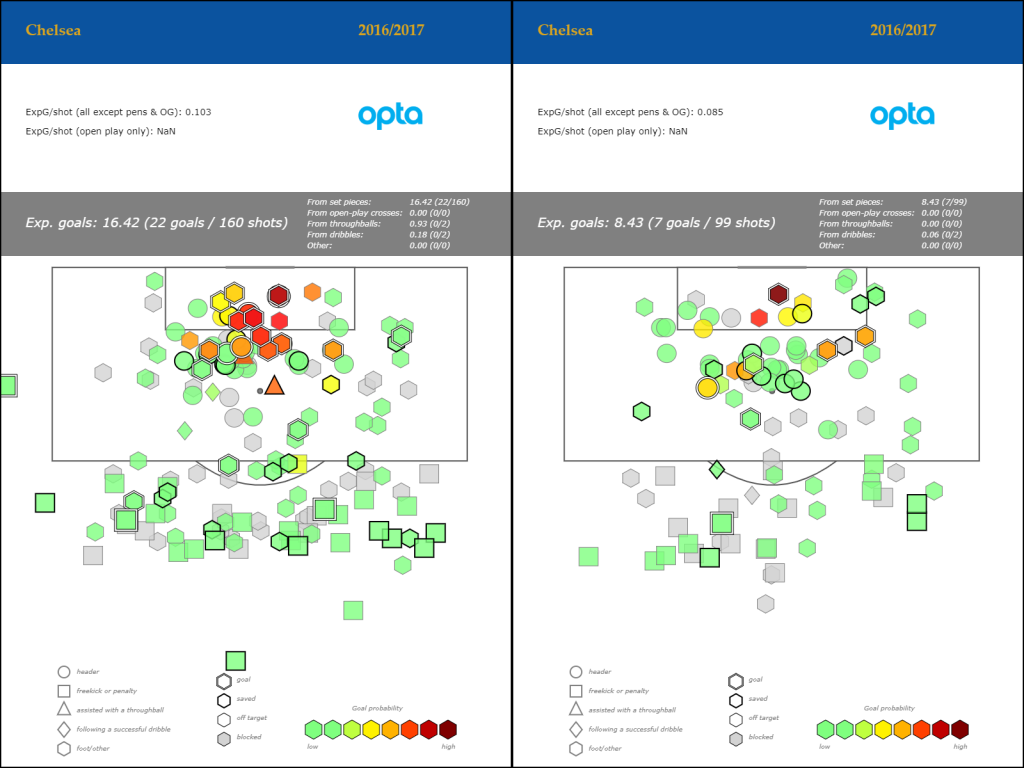
Chelsea were +15 in this phase of the game.
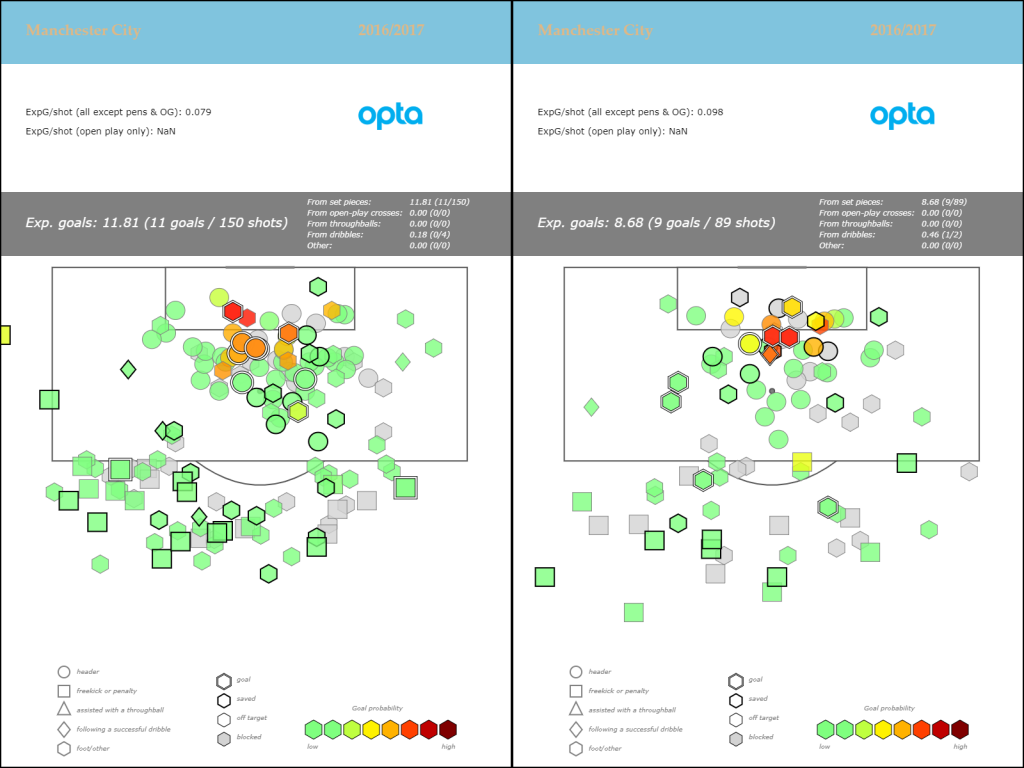
Man City were +2.
They scored nearly identical amounts of goals from open play, but the goal difference in the table between Chelsea and City was +11 in favour of the champions.
There’s also a decent case to be made that set pieces helped save Swansea as well. Swansea were abysmal for years in this phase of the game, but I know for a fact it was a weakness discussed with the owners before the season started. Last season the Swans finished 3rd in the league in set piece goals scored behind only Chelsea and West Brom. That's quite a departure from the 8 they scored in 15-16 and the 4 - yes, FOUR - they scored in 14-15.
Outside England, Monaco beat PSG to the Ligue 1 title last season on the back of 23 set piece goals (PSG scored 13), and they’ve already scored 8 in 7 games this year, despite selling what felt like half their squad in the summer transfer window.
So the first edge comes from knowing you can move the needle significantly in this area if you start to focus on set pieces and give them training time.
Just so we're clear, this has not been common sense or common knowledge in football. A few years ago the analyst community thought performance in this area was largely random, and it’s still treated as an afterthought at the vast majority of football clubs.
A Story
Last year I was invited to talk to a big club outside of England about using data and competitive edges. The discussion rolled around to set pieces, and I gave a presentation similar to what I linked in my intro piece above, highlighting different areas you can focus on with corners, free kicks, etc At the time I was there, the club was doing terribly on attacking set pieces, so I flagged a few quick things they might want to work on to improve.
One of the easy ones was discussing the use of screens on direct free kicks. Allow me to explain…
For goalkeepers, reaction time equates to distance.
The quicker your reactions are, the further you/your hands/your body can travel in order to make saves. Additionally, the further away a goalkeeper sees a shot, the more time they have to react and move to make a save. We even mix up the jargon here when describing what happened in commentary. “He saw it early, so he was able to make the save.” Early is a word associated with time, but what we really care about with GKs is how far they can travel before to intersect that ball before a shot gets past them.
So yeah, time equals distance. Goalkeepers and quantum mechanics for the win.
With direct free kicks, this is quite a big deal. Walls tend to impair goalkeeper sight at least a little bit, and one of the things I learned from Gianni Vio is that attacking teams can make sightlines absolutely miserable for keepers if they want to.
Why would they want to?
Because the later a goalkeeper picks up the ball in flight, the less distance they can move to make a save, and the bigger the target the free kick taker has in order to score a goal.
Translation: it makes scoring a goal from a free kick a lot easier.
I was reminded of this when watching Liverpool face Leicester this weekend. Coutinho’s goal Saturday might have been unsaveable, but he had a goal against Arsenal last season from a free kick that I broke down at the time in a frustrated email to friends at [redacted].
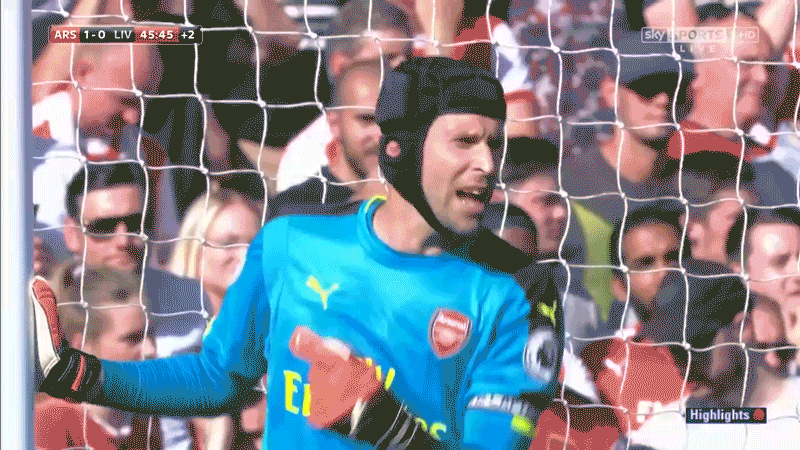
Notice the two-man Liverpool screen in Arsenal's wall. They are standing there to help obstruct Cech's view of the kick as it's taken. There are actually better things they could do to cause problem, but it's a solid start.
Also note how far out this kick is taken. Cech should have ages to see the ball and make the save, even though he's probably a bit too far over in positioning to the far post.
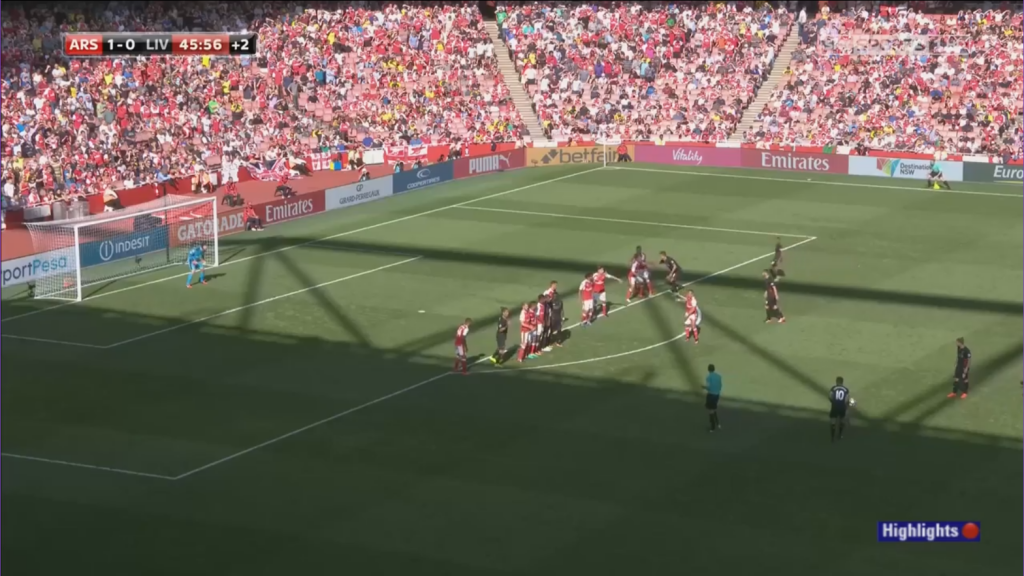
But this is approximately where Cech finally sees the ball. It's hit pretty hard, which creates huge problems (remember, time = distance).
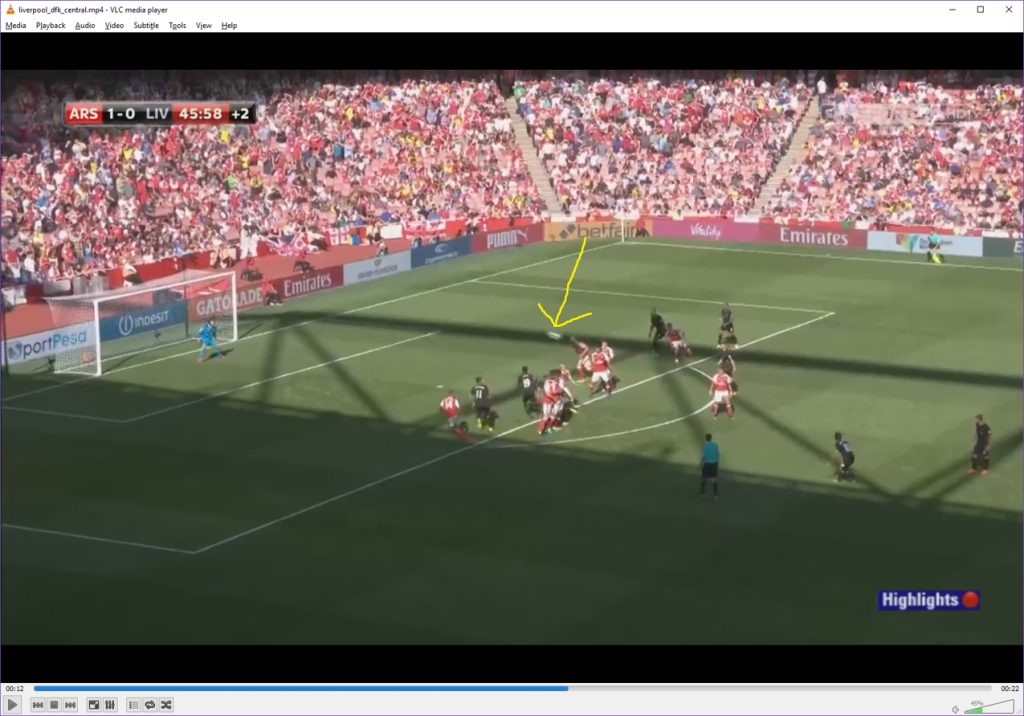
And finally, it's a bit fuzzy, but this is how much Cech missed the ball by. It's a tiny amount.
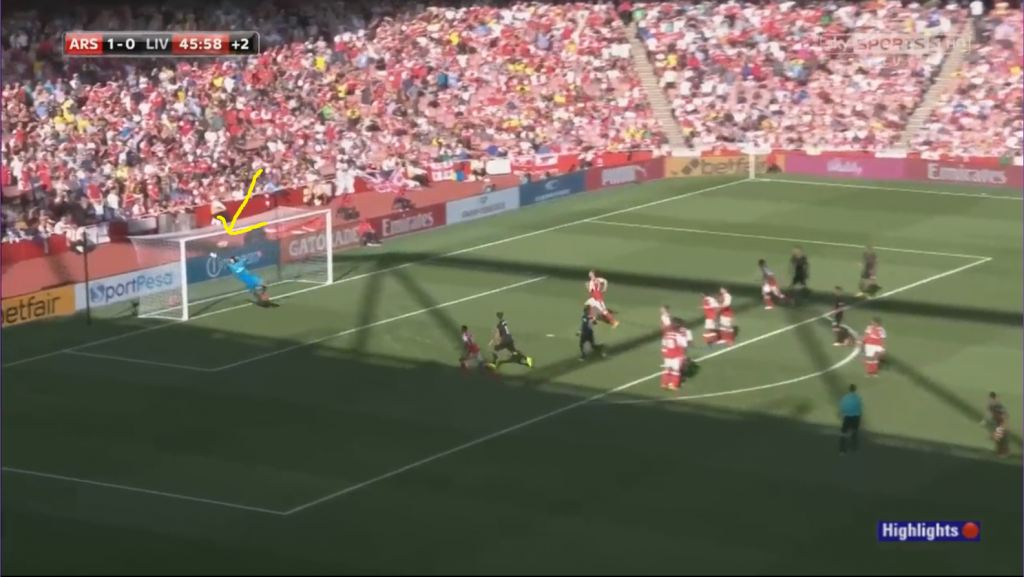
The reason I bring this up is because of the reaction I got from the coach I was presenting to at the time.
“Well that’s very simple and obvious,” he said.
And he’s right. It’s a gobsmackingly obvious thing to do…
IF YOU KNOW ABOUT IT.
In fact, it's one of the very basic tells Nikos Overheul and I use to see if teams are paying a lot (or even a little) attention to set pieces when we scout them for tactics.
“You’re probably correct,” I agreed. “On the other hand, before travelling here, I watched every direct free kick your team has taken for the last year and your players never screen the keeper.”
*silence*
“I'm with you though, this one is easy to fix once you know about it. Thankfully there are a lot of less obvious things we do to help in this phase of the game as well.”
Sadly, we did not get a chance to help them on set pieces last season.
And despite how obvious my point may have been, I checked their video for this season before writing today - they still don’t screen DFKs in any reasonable way.
For those of you looking to learn a little more about the game, you now have one of our dirty little secrets: always add screens to attacking free kicks.
Wrapping Up
I don’t talk about set pieces much because I don’t want to give away edges to competitors of our clients or ruin the value we offer to future customers. That said, even with more awareness around the value of this phase of the game, most clubs place little or no emphasis on it, despite the fact that it's clearly a cheap way to get extra goals and can both help keep clubs up and win them titles.
We’re currently determining our schedule for the winter break and next spring regarding tutelage for coaches and analysis of set pieces for teams. If you work for a professional club who could use help in this area, please get in touch.
Ted Knutson
@mixedknuts
ted@statsbomb.com
